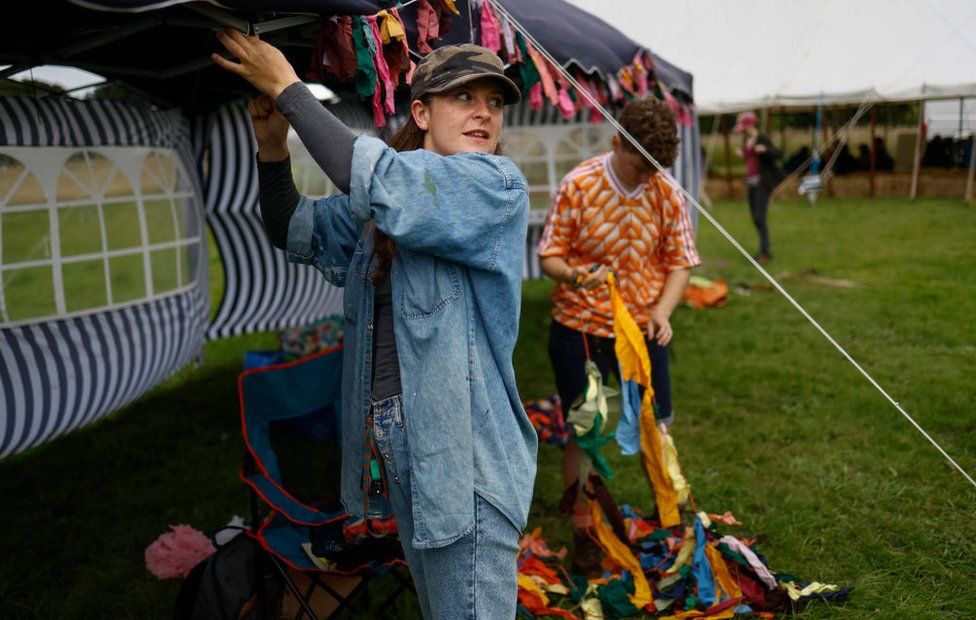
Campers set up community tents for the stint in Kinneil Park
Environmental activists have set up one of Scotland’s largest protest camps in a decade near an oil refinery.
Climate Camp Scotland said they wanted the space in Kinneil Park in Grangemouth to be open for all to come and discuss the climate emergency.
The group said figures showed chemical giant Ineos was “Scotland’s biggest polluter”.
But the multinational firm said it operated a “safe, sustainable business” and met its climate responsibilities.
Ineos pumps out about 2.4 million tonnes of carbon dioxide emissions per year, according to figures campaigners obtained from the Scottish Environment Protection Agency (Sepa).
Activists said that the site could be renewed with sustainable jobs and industries.
The group set up camp just a mile from the oil terminal on Wednesday and will remain there until Monday.
On Saturday morning they will march from the campsite, near Falkirk, to an undisclosed protest site.
Organiser Jess Johannesson said the space was family friendly, and they welcomed everyone – even people who might disagree with them.
Image source, PA Media
Campaigners set up the campsite on Wednesday
She said 150 people from many different climate groups and backgrounds had come together to stay at the camp.
More are expected to arrive over the weekend.
Ms Johannesson said: “We’re protesting against Scotland’s biggest polluter – by quite a margin – the Ineos site at Grangemouth.
“The camp is an opportunity for local community members, climate activists, industry workers and people who are concerned about the climate crisis to come together and think about how to move forward to a just future for everyone.
“Grangemouth is a perfect example of why the current energy system we have doesn’t work for anyone except for CEOs of energy companies.
“Ineos made a profit of over £400m last year while the community in Grangemouth suffers from fuel poverty, with a huge petrochemical plant as their neighbour. It couldn’t be any starker than that.”
Image source, Getty Images
Activists plan to march on Saturday
She added the group had invited locals to speak about the impact of living next to the petrochemical site, as well as a former worker in the oil industry.
“We want to start a conversation so we no longer talk about the cost of living crisis separate from the climate crisis,” she said.
“Both are very much one thing and they affect the same people the most and the same people also profit from it.”
The activist said the Grangemouth camp was the third the group had organised, following similar sites at Mossmorran and Aberdeen.
They are holding workshops on the climate crisis, including on fuel poverty and what a just transition might look like, as well as fun and family friendly activities.
She encouraged people to drop by and speak to members about the camp.
Image source, Getty Images
Anyone is welcome to drop by the camp
Police Scotland said it was aware of the planned march on Saturday and a comprehensive policing plan was in place to maintain people’s safety and enable peaceful protest.
An Ineos spokesperson wished those taking part in the event a “safe week”.
They added: “This is our home, where we operate a safe, sustainable business that serves the Scottish economy well, provides skilled jobs and essential products while meeting its climate responsibilities.”
The spokesperson said Ineos was one of Scotland’s last remaining large-scale manufacturing companies.
They continued: “We provide many of the basic raw materials that are essential to many of the products that we all use on a daily basis, from mobile phones, to water and gas pipes, to medical products, cars, buses and trains, tents, waterproofs and training shoes.
“Even wind turbines and solar cells need the products made here by thousands of skilled workers.”
The company said it was working towards being a net zero manufacturer by 2045 and was making “good progress”.
Ineos added that it had reduced emissions by nearly 40% since it bought the Grangemouth site and planned to reduce emissions by more than 65% using hydrogen and carbon capture.








